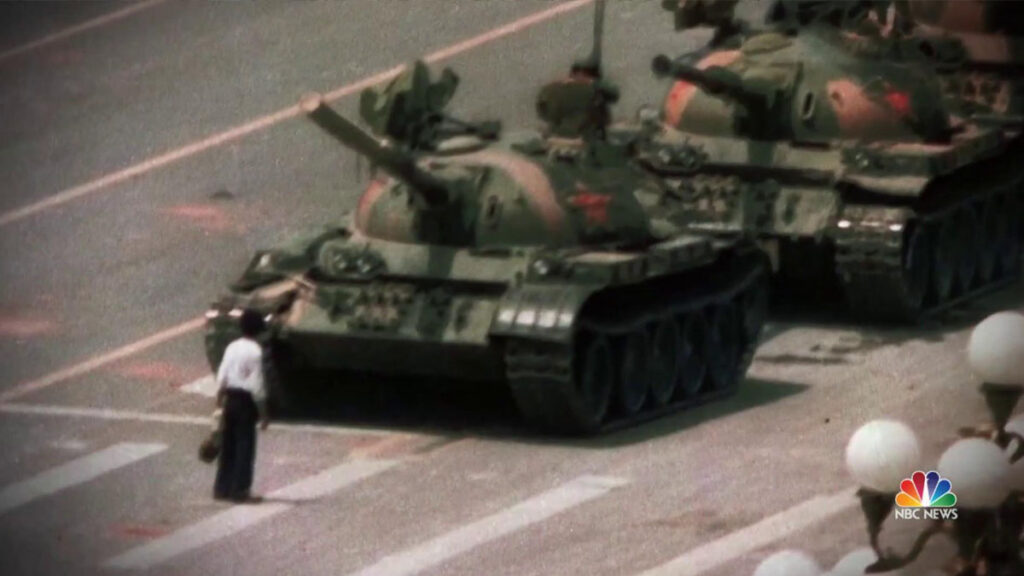Thirty-five years ago, the heart of Beijing witnessed an event that would forever mark a dark chapter in China’s history—the Tiananmen Square Massacre. On June 4, 1989, thousands of pro-democracy demonstrators, primarily students, gathered peacefully in Tiananmen Square, calling for freedom, accountability, and an end to government corruption. The Chinese government’s response was brutal and unyielding, leading to one of the most heinous crackdowns on peaceful protestors the world has ever seen. Today, the Chinese government continues to attempt to erase the memory of this massacre, employing various strategies to suppress any discussion or commemoration of the event.
The Massacre
In the weeks leading up to the massacre, Beijing’s Tiananmen Square was filled with hopeful voices demanding democratic reforms. These gatherings reached a climax in late May 1989, prompting the Chinese government to declare martial law. On June 3 and 4, the People’s Liberation Army was deployed to the streets of Beijing. Soldiers, backed by tanks and armored vehicles, opened fire on unarmed protestors and bystanders, killing and injuring untold numbers. The exact death toll remains unknown, but estimates range from hundreds to possibly thousands. In the aftermath, the government launched a nationwide crackdown, arresting thousands on charges such as arson and disrupting social order.
Erasing the Memory
Since the massacre, the Chinese government has been relentless in its efforts to bury the events of June 4, 1989. They have never accepted responsibility or held any officials accountable for the killings. The government has also refused to investigate the events or release data on those who were killed, injured, disappeared, or imprisoned. Instead, they have systematically censored any mention of the massacre, both online and offline, ensuring that younger generations grow up unaware of this pivotal moment in their nation’s history.
In the lead-up to the 35th anniversary, the Chinese authorities intensified their efforts to stifle remembrance. Individuals who attempted to honor the victims, like Xu Guang, a former student leader, were imprisoned on charges such as “picking quarrels and provoking trouble.” Xu Guang’s story is a grim reminder of the severe penalties for those who dare to speak out. Tortured and mistreated in detention, Xu’s ordeal highlights the brutal lengths to which the government will go to silence dissent.
Hong Kong: A New Battleground
The suppression of memory extends beyond mainland China, reaching into Hong Kong. Once a bastion of free speech and annual vigils commemorating the Tiananmen Massacre, Hong Kong has seen its freedoms erode under the imposition of draconian laws. On May 28 and 29, 2024, Hong Kong police arrested several individuals, including lawyer-activist Chow Hang-tung and her mother, for posts related to the massacre’s anniversary. Chow, a prominent figure in organizing Tiananmen vigils, now faces severe penalties under the new National Security Law. The law punishes peaceful speech and civil society activism with heavy prison sentences, reflecting Beijing’s tightening grip on the city.
International Silence and Complicity
The international response to the Tiananmen Massacre and subsequent human rights abuses in China has been disappointingly muted. Some sanctions imposed by the European Union and the United States have weakened over time, and there has been a lack of sustained and coordinated pressure on Beijing. This tepid response has emboldened the Chinese government to continue its human rights violations, not just domestically but globally. From crimes against humanity in Xinjiang to the suppression of freedoms in Hong Kong and the persecution of human rights defenders, Beijing’s abuses are increasingly unchecked.
Calls for Justice
Despite the Chinese government’s attempts to erase history, the flames of remembrance and the call for justice continue to burn. Groups like Tiananmen Mothers, composed of relatives of massacre victims, persist in their demands for accountability. They urge the government to publish the names of those who died, offer compensation to victims’ families, and hold responsible officials legally accountable. These demands, however, fall on deaf ears as the Chinese government remains resolute in its denial and suppression.
As we mark the 35th anniversary of the Tiananmen Square Massacre, it is crucial for the international community to renew efforts to hold the Chinese government accountable. Supporting calls from UN human rights experts and publicly commemorating the anniversary can help keep the memory of the massacre alive and highlight the ongoing struggle for human rights in China.
China would be much better off if they accepted responsibility for this and implemented reparations, but this is not their way. The Chinese Communist Party (CCP) can do no wrong, they will force the people to accept this as a necessary event, and will try to get the rest of the world to forget the utter brutality of it. This is why free countries oppose China.
